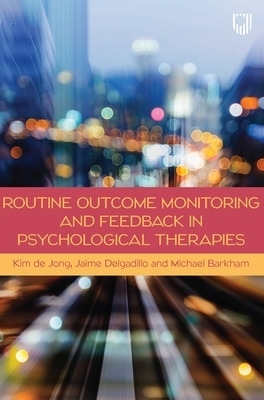
Routine Outcome Monitoring and Feedback in Psychological Therapies
Seiten
2023
Open University Press (Verlag)
978-0-335-24969-5 (ISBN)
Open University Press (Verlag)
978-0-335-24969-5 (ISBN)
“This book is clear, well-written, evidence-based, and timely. Combined with the authors’ decades of practice-based research and clinical experience, it describes a way helping professionals of all stripes can improve the results of psychological care.”
Scott D. Miller, Ph.D., International Center for Clinical Excellence, USA
“A must-read for every therapist, supervisor, researcher, manager – and client – in the field of mental health.”
Helene A. Nissen-Lie, Professor in Clinical Psychology and Therapist, University of Oslo, Norway
“The depth and breadth of these authors’ knowledge about progress monitoring shine through on every page.”
Jacqueline B. Persons, Director, Oakland Cognitive Behavior Therapy Center and Clinical Professor, Department of Psychology, University of California at Berkeley, USA
“I highly recommend this book to anyone wanting to work with a routine outcome monitoring (ROM) and feedback system in psychological therapies.”
Professor Mike Lucock, Centre for Applied Research in Health, University of Huddersfield, UK.
Based on the authors’ own varied and extensive experiences as practitioners, this clear and practical guide shows therapists and trainees how feedback can best be used to inform treatment decisions and, ultimately, improve patient outcomes.
Key features include:
• An up-to-date analysis of the current evidence base about the effectiveness of progress feedback
• Advice on how to effectively implement Routine Outcome Monitoring in teams, services, and healthcare systems
• Instructive clinical vignettes and examples of therapist-patient dialogue
• Advice on how to deal with negative feedback
• Clinical guidelines for therapists and guidance on translating theory into practice.
Routine Outcome Monitoring and Feedback in Psychological Therapies brings together the collective wisdom of research leaders in the field and experienced therapists and patients to provide the go-to guide on how to integrate Routine Outcome Monitoring and feedback into psychological therapies.
Kim de Jong, Ph.D. is Senior Assistant Professor of Clinical Psychology at Leiden University, the Netherlands and a cognitive behavioural therapist. She is one of the leading researchers on ROM and feedback and has implemented ROM in a wide variety of settings.
Jaime Delgadillo, Ph.D. is Professor of Clinical Psychology at the University of Sheffield, UK, and is trained as a psychoanalyst and cognitive behavioural therapist. He is known for the development and evaluation of feedback systems, digital health and AI technologies in the field of mental health.
Michael Barkham, Ph.D., FBPsS is Professor of Clinical Psychology at the University of Sheffield, UK and was previously Professor of Counselling and Clinical Psychology at the University of Leeds, UK. He is a well-known developer of outcome measures and has encouraged their use in routine practice over the past 35 years.
Scott D. Miller, Ph.D., International Center for Clinical Excellence, USA
“A must-read for every therapist, supervisor, researcher, manager – and client – in the field of mental health.”
Helene A. Nissen-Lie, Professor in Clinical Psychology and Therapist, University of Oslo, Norway
“The depth and breadth of these authors’ knowledge about progress monitoring shine through on every page.”
Jacqueline B. Persons, Director, Oakland Cognitive Behavior Therapy Center and Clinical Professor, Department of Psychology, University of California at Berkeley, USA
“I highly recommend this book to anyone wanting to work with a routine outcome monitoring (ROM) and feedback system in psychological therapies.”
Professor Mike Lucock, Centre for Applied Research in Health, University of Huddersfield, UK.
Based on the authors’ own varied and extensive experiences as practitioners, this clear and practical guide shows therapists and trainees how feedback can best be used to inform treatment decisions and, ultimately, improve patient outcomes.
Key features include:
• An up-to-date analysis of the current evidence base about the effectiveness of progress feedback
• Advice on how to effectively implement Routine Outcome Monitoring in teams, services, and healthcare systems
• Instructive clinical vignettes and examples of therapist-patient dialogue
• Advice on how to deal with negative feedback
• Clinical guidelines for therapists and guidance on translating theory into practice.
Routine Outcome Monitoring and Feedback in Psychological Therapies brings together the collective wisdom of research leaders in the field and experienced therapists and patients to provide the go-to guide on how to integrate Routine Outcome Monitoring and feedback into psychological therapies.
Kim de Jong, Ph.D. is Senior Assistant Professor of Clinical Psychology at Leiden University, the Netherlands and a cognitive behavioural therapist. She is one of the leading researchers on ROM and feedback and has implemented ROM in a wide variety of settings.
Jaime Delgadillo, Ph.D. is Professor of Clinical Psychology at the University of Sheffield, UK, and is trained as a psychoanalyst and cognitive behavioural therapist. He is known for the development and evaluation of feedback systems, digital health and AI technologies in the field of mental health.
Michael Barkham, Ph.D., FBPsS is Professor of Clinical Psychology at the University of Sheffield, UK and was previously Professor of Counselling and Clinical Psychology at the University of Leeds, UK. He is a well-known developer of outcome measures and has encouraged their use in routine practice over the past 35 years.
Chapter 1. What is routine outcome monitoring and why should I use it?
Chapter 2. Principles for selecting ROM and feedback tools for your practice
Chapter 3. Barriers and enablers for implementation
Chapter 4. Common problems and solutions to promote adherence to Routine Outcome Monitoring
Chapter 5. Introducing Routine Outcome Monitoring to patients
Chapter 6. Interpreting scores and patterns in measurements
Chapter 7. Recognizing when a patient is not improving
Chapter 8. Clinical troubleshooting for non-improving patients
Chapter 9. Integrating Outcome Monitoring and feedback in clinical supervision
Chapter 10. Consolidating practice and embracing future challenges
| Erscheinungsdatum | 28.06.2023 |
|---|---|
| Verlagsort | Milton Keynes |
| Sprache | englisch |
| Maße | 151 x 228 mm |
| Gewicht | 260 g |
| Themenwelt | Geisteswissenschaften ► Psychologie |
| ISBN-10 | 0-335-24969-8 / 0335249698 |
| ISBN-13 | 978-0-335-24969-5 / 9780335249695 |
| Zustand | Neuware |
| Haben Sie eine Frage zum Produkt? |
Mehr entdecken
aus dem Bereich
aus dem Bereich
warum wir fühlen, was wir sind
Buch | Hardcover (2023)
Klett-Cotta (Verlag)
35,00 €
Kleine Auf-Bau-Therapie - Neuropsychologisches Therapieprogramm für …
Buch (2023)
modernes lernen (Verlag)
29,95 €


